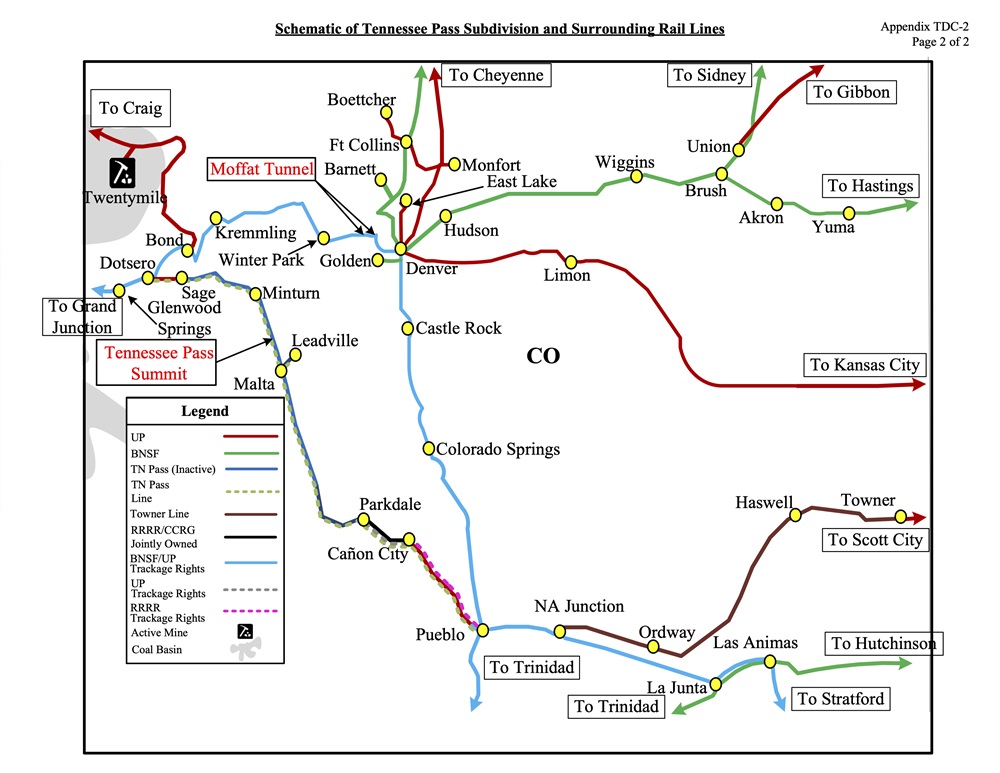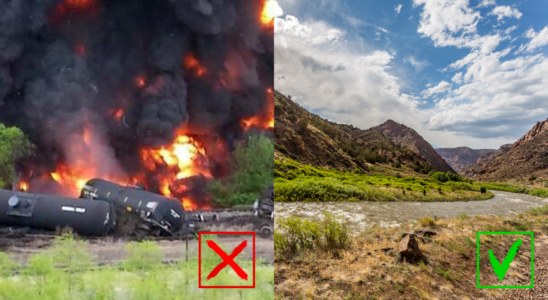400,000 barrels per day. That is the amount of new crude petroleum that could be moved through Colorado’s Rocky Mountains by train if the proposed Tennessee Pass Railway is rebuilt through West/Central Colorado. The dormant Union-Pacific-owned railway was a fundamental part of passenger and freight rail between Glenwood Springs and Pueblo along the Arkansas River, but was closed decades ago as derailment incidents plagued the steep and curvy tracks and the mining industry shifted out of smaller mountain towns. Now with this controversial push to build the Uinta Basin Railway to connect oil and gas fields in Northern Utah to the nation’s central rail and refining system, eyes are back on Tennessee Pass as a shortcut for crude oil trains heading east.
Sign 350 Central Colorado’s petition to oppose the Tennessee Pass Railway here.

Source: https://trn.trains.com/~/media/images/news-wire/2020/02-february/tennesseepassmap.jpg
In 2013 alone, 1.14 million gallons of crude petroleum were spilled in North American rail accidents. That year also brought the deaths of 47 civilians that were killed when a freight train carrying crude oil derailed and exploded in the small town of Lac-Megantic, Quebec, while hauling petroleum freight from North Dakota. When it comes to potential oil spills in Colorado, it is not a matter of if, but when. Our communities are not only at risk for spills from petroleum products, but any number of chemicals that do not legally need to be disclosed to the communities they are passing through per EPA regulations on rail transport. The risks to our citizens from explosions and spills are significant, given the railroad’s passing directly through our towns, roadways, and recreation areas.
Despite attempts to posit this rail project as a “green” alternative to shipping by truck and the potential for shared-line passenger rail, it has been made clear that the re-animation of this railway would not be with the intent of efficient trains that would serve our communities, but an environmental disaster waiting to happen. Many sections of the Tennessee Pass line run within feet of the Arkansas River, and cross directly over important creeks and streams that feed it. Even a small spill would devastate the Gold Medal Trout fishing and wildlife habitat the Ark has become known for and pose a serious threat to the rafting and kayak industries that are the heart of green tourism in Buena Vista, Salida, and the Royal Gorge.
Additionally, the amount of greenhouse gases and carbon released in the construction, mining, transport, and increased refining created by this project would be a significant contributor to global warming. The Salt Lake Tribune reported that the Utah segment of the rail line could enable the Uinta Basin oil production to nearly quadruple its current amounts of crude oil extraction. Connecting that extraction site to refineries with the Tennessee Pass Rail Line, will not only jeopardize our local communities, but would directly work against one of the most recent executive orders released on January 27th, by President Biden.
In order to mitigate climate change and move away from fossil fuel production, transportation, and proliferation, the order states “The Federal Government must drive assessment, disclosure, and mitigation of climate pollution and climate-related risks in every sector of our economy…. Together, we must combat the climate crisis with bold, progressive action that combines the full capacity of the Federal Government with efforts from every corner of our Nation, every level of government, and every sector of our economy.” President Biden’s order goes on to request, “substantive engagement by stakeholders, including state, local, and Tribal governments,” in this effort.
It is our intent to insist governing bodies, in whatever ways possible, follow through on efforts to focus Colorado infrastructure and policy on fossil-fuel-free, climate-minded solutions. We will stand up against agencies and entities that do not take these necessary actions for the climate seriously. It is clear that the destiny for this railway as a fossil fuel transportation corridor does not fulfill this vision of a green future for Colorado, the United States, or our planet.
Please join us in taking action against this disastrous project by signing 350 Central’s petition here!

The Uinta Basin Railway Petition Here
And volunteering to help our small mountain teams fight this project by filling out our volunteer interest form!
Angie and 350 Central Colorado Team
